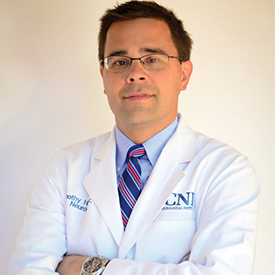 Timothy Hecker is one of the youngest Medical Alumni Association presidents in the organization's history.Timothy Hecker, M.D., is accustomed to being the youngest at things. As the youngest of seven children, he was constantly trying to keep up with his older siblings, a determination that would serve him well in his academic pursuits. “It wasn’t always easy, but it spurred me to achieve more,” explains Hecker, a Mobile native and 2004 graduate of the School of Medicine. This year, Hecker, 40, became one of the youngest presidents of the University of Alabama Medical Alumni Association (MAA) in recent memory.
Timothy Hecker is one of the youngest Medical Alumni Association presidents in the organization's history.Timothy Hecker, M.D., is accustomed to being the youngest at things. As the youngest of seven children, he was constantly trying to keep up with his older siblings, a determination that would serve him well in his academic pursuits. “It wasn’t always easy, but it spurred me to achieve more,” explains Hecker, a Mobile native and 2004 graduate of the School of Medicine. This year, Hecker, 40, became one of the youngest presidents of the University of Alabama Medical Alumni Association (MAA) in recent memory.
Initially an engineering major at Catholic University in Washington D.C., Hecker ultimately realized he needed a different career. “Deciding to become a doctor was a good mix for me in terms of the personal interaction, the intellectual stimulation, building relationships, and wanting to help others,” he says. “Plus, I’ve always had an interest in brain science.”
Hecker, who completed his neurology residency at UAB in 2008, currently practices at Mobile’s Coastal Neurological Institute, where he enjoys getting to know the patients he treats. “Many of the diseases and processes we try to take care of touch a lot of people, including movement disorder. Parkinson’s disease is a big focus of mine, along with multiple sclerosis and seizures. In the hospital, I work a lot with strokes.”
Despite putting in long hours at the office, Hecker recognizes the importance of making time for family. He has two kids with his wife Devon Walsh, a news anchor at the Mobile and Pensacola CBS affiliate WKRG. “Trying to fit it all in can be tough,” admits Hecker. “You have to love what you do and somehow make it work. You learn to juggle. My wife and I work as a team very well, and my two kids understand that daddy sometimes has to be away from home to help sick people.”
Hecker credits his School of Medicine mentors with helping him realize his potential as a neurologist. “At UAB, I was exposed to Dr. Ray Watts, who, without a doubt, is one of my role models. He had the ability to take the intellectual part of medicine and make you feel comfortable. Anyone who knows him will tell you the same thing.”
Burt Nabors, M.D., and Khurram Bashir, M.D., were also major influences. “You look at the people you admire, and you try to take on some of their qualities. These men all have traits I’ve tried to emulate as best I can.”
Hecker reflects on his time at the School of Medicine with a great deal of pride. “Going through each clinical rotation, you’re around some of the most unbelievable mentors and teachers, and some of the best students,” he says. “Those were some of the most awe-filled moments of my life. It was hard, but you realized what you were doing was becoming the physician you wanted to become.”
Hecker hopes his unique status as a relatively young MAA president will help him reach out not only to graduates of the School of Medicine but also to current students to offer advice or a helping hand.
“As doctors get later in their careers, they may have more time to take on something like this,” he says, acknowledging that he is assuming these responsibilities earlier. “But I think it’s important for younger doctors to realize the relationship we should have with the giants in medicine who’ve come before us. Our generation needs to realize that we need to stay connected to these people.”
By Cindy Riley